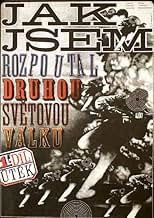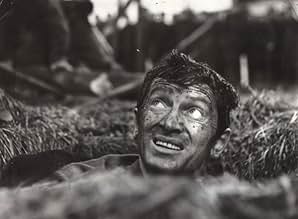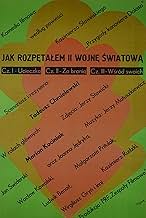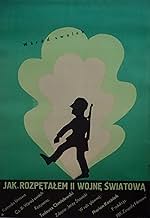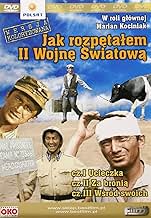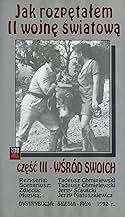Jak rozpetalem druga wojne swiatowa
- 1970
- 3h 44min
VALUTAZIONE IMDb
8,0/10
4004
LA TUA VALUTAZIONE
Aggiungi una trama nella tua linguaThe adventures of unlucky Polish soldier Franek Dolas during world war II. In September he escapes from Stalag and goes to France. After that he fights in Africa and Europe.The adventures of unlucky Polish soldier Franek Dolas during world war II. In September he escapes from Stalag and goes to France. After that he fights in Africa and Europe.The adventures of unlucky Polish soldier Franek Dolas during world war II. In September he escapes from Stalag and goes to France. After that he fights in Africa and Europe.
- Regia
- Sceneggiatura
- Star
Recensioni in evidenza
This movie is one of the best polish movies there were ever made! The great story, the patriotism, the characters and most of all the irresistible humor have made this movie so special, that it entertains viewers of many generations! While most war movies show the terror of it, this movie shows it's brighter side. The side where people are brave, patriotic and they managed to do the impossible! Also shows how true is an old polish quote: "If a Pole wants to do something, he'll do it no matter how!" If you'd ask me, I'd gave you examples from my family that could prove those incredible situations! Hope you all will see it and like it as much as I do! Greycat R! Krystian Andrzej Dylewski
Long 3 part funny story of a guy who travels all wartime Europe in almost every uniform.
Great cast of famous actors o the era. And some dialogues became classic.
Great cast of famous actors o the era. And some dialogues became classic.
The film is one of classic Polish comedies, often aired in Polish TV, and I like it quite much. The main hero is Polish soldier Private Franek Dolas, a charming wangler, who is convinced, that he had started World War Two with his accidental shot (it is a bravura life role of Marian Kociniak). He escapes from a POW camp, and then desperately tries to join the Polish Army, being organized in Great Britain. The film is quite long three-part trilogy, but we follow adventures of Private Dolas from 1 September 1939 towards the end of the war, across Nazi occupied Europe, Middle East and North Africa. And there is also a romance plot in last part.
The whole story is inspired by fates and stories of many Polish soldiers, who escaped from occupied country and got to French or British allies to continue fighting. It was truly a difficult task during the war, because they had to travel illegally through neutral or Nazi-allied countries, avoiding imprisonment or internment. Many of them found themselves eventually in North Africa, where Polish units fought on British side in 1941-1942 against Germans and Italians. One patrol even captured Italian military bordello indeed...
Since Franek Dolas travels through different countries, a humour mainly explores national stereotypes and cultural clashes, but in rather gentle and non-derogatory way. So, the Germans are unable to write down an overcomplicated fake Polish name (Brzeczyszczykiewicz), the Yugoslavians are hospitable, while the British are stiff and care about nothing during a tea time (it also was an experience of Polish soldiers, raised in different culture). On the other hand, the Poles, personalized by the main hero, are reckless and always get into trouble. In fact, Private Dolas succeeds in many things only by accident. French captain is always drunk on wine and wants to fight for Marshall Petain - but on the other hand, his soldiers join the Free French to continue fighting. The Italians try to surrender, or they fight only for their women - but we also see brave Italian commandos. A great and remarkable thing in this film is, that all characters speak their own languages, what makes language barriers obvious, and increases reality feeling.
The film was made as black and white, but gained much thanks to a digital colorization.
The whole story is inspired by fates and stories of many Polish soldiers, who escaped from occupied country and got to French or British allies to continue fighting. It was truly a difficult task during the war, because they had to travel illegally through neutral or Nazi-allied countries, avoiding imprisonment or internment. Many of them found themselves eventually in North Africa, where Polish units fought on British side in 1941-1942 against Germans and Italians. One patrol even captured Italian military bordello indeed...
Since Franek Dolas travels through different countries, a humour mainly explores national stereotypes and cultural clashes, but in rather gentle and non-derogatory way. So, the Germans are unable to write down an overcomplicated fake Polish name (Brzeczyszczykiewicz), the Yugoslavians are hospitable, while the British are stiff and care about nothing during a tea time (it also was an experience of Polish soldiers, raised in different culture). On the other hand, the Poles, personalized by the main hero, are reckless and always get into trouble. In fact, Private Dolas succeeds in many things only by accident. French captain is always drunk on wine and wants to fight for Marshall Petain - but on the other hand, his soldiers join the Free French to continue fighting. The Italians try to surrender, or they fight only for their women - but we also see brave Italian commandos. A great and remarkable thing in this film is, that all characters speak their own languages, what makes language barriers obvious, and increases reality feeling.
The film was made as black and white, but gained much thanks to a digital colorization.
Contrary to what that one comment on the bottom says, there are so many moments during this movie that are so hilarious that you can hardly contain yourself. Its funny, and yet gives you a thing to think about. It's a classic and you won't be disappointed. The whole language realism makes it even better. I will say though, it is an especially long movie, consisting of 3 parts, each about an hour, but it is still worth every minute. I have heard people say that there is nothing funny about ww2. Well this exists, and this came out in a rather dark time in Poland's history, and that really goes to show how you can really make something terrible into something enjoyable. The fact that this came out from a communist film studio and that it is better than most modern movies is truly something else.
This is one of the best comedies in the world. Very subtle and pleasant humor in such a humor-heavy setting like war. In terms of mood and light style, the film can be compared to "Rosencrantz and Guildenstern are Dead" and Taika Waititi's films.
Lo sapevi?
- QuizThe film is unique in terms of language realism: members of each nationality, encountered by a main hero on his way, speak their own language (German, Serbo-Croatian, French, Italian, English), what makes his adventures and communication problems more realistic.
- BlooperWhen the film was colorized in 2000, the Yugoslav flag was miscolored, with green in the place of blue.
- Citazioni
Pvt. Franek Dolas: B-but our place is in the Polish army! We must fight for Poland!
Sgt. Kiedros: And for which Poland do you want to fight for?
- Versioni alternativeAlso shown in computer colorized version. This version was prepared by "Dynacs Digital" and has never been released theatrically. It was first shown by TV Polsat.
- ConnessioniReferenced in Nie lubie poniedzialku (1971)
I più visti
Accedi per valutare e creare un elenco di titoli salvati per ottenere consigli personalizzati
- How long is How I Unleashed World War II?Powered by Alexa
Dettagli
- Data di uscita
- Paese di origine
- Lingue
- Celebre anche come
- How I Unleashed World War II
- Luoghi delle riprese
- Zgierz, Lódzkie, Polonia(POW camp)
- Azienda produttrice
- Vedi altri crediti dell’azienda su IMDbPro
- Tempo di esecuzione3 ore 44 minuti
- Colore
- Mix di suoni
- Proporzioni
- 2.35 : 1
Contribuisci a questa pagina
Suggerisci una modifica o aggiungi i contenuti mancanti

Divario superiore
By what name was Jak rozpetalem druga wojne swiatowa (1970) officially released in Canada in English?
Rispondi
